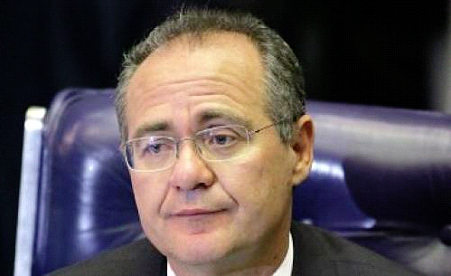BRASILIA, (Reuters) – Renan Calheiros took an Air Force jet to get hair implants and was accused of letting a lobbyist pay child support to a journalist he had an affair and a child with.
Either episode would have derailed many politicians but corruption allegations have not kept Calheiros, the 59-year-old president of Brazil’s Senate, from making himself a go-to partner in the chaotic dance of Brazilian politics.
President Dilma Rousseff, her government beset by economic and corruption crises that some believe could cost her the presidency, is the latest to take his hand.
With the power to stall legislation and conduct an impeachment of Rousseff that some opponents seek, Calheiros instead has dropped his former obstruction to Rousseff’s initiatives and proposed a series of business-friendly measures designed to give her hamstrung government a little traction. The turnaround provides much needed relief for Rousseff at a time when Brazil’s economy is mired in recession, her governing coalition is in tatters and many political and business leaders are behind bars because of a massive corruption scandal around Brazil’s state-run oil company Petrobras.
“She was drowning in a whirlpool and he threw her a lifeline,” said David Fleischer, politics professor emeritus at the University of Brasilia.

But the pairing, fellow politicians warn, is very much one of convenience. In Calheiros, they see a man eager to avoid the fate of Eduardo Cunha, a fellow party member and speaker of the lower house of Congress, who was recently charged in the kickback scandal at Petrobras.
Their center-right Brazilian Democratic Movement Party, or PMDB, ostensibly is part of the government coalition but shares very little ideological ground with Rousseff’s leftist Workers’ Party.
Infamous for a realpolitik through which it secures ministries and other valuable posts in exchange for legislative support, the PMDB these days looks increasingly like the opposition.
So many believe Calheiros, who prosecutors have said is one of 32 politicians under investigation, is only cozying up to Rousseff in the hopes he can avoid prosecution.
“He is breathing life into a lame duck president,” says Wellington More Franco, a veteran and influential member of the PMDB. “I’m not sure he has enough oxygen reserve to supply his needs and hers.”
Representatives of Calheiros did not return repeated requests for comment.
PLENTY TO GAIN
To date, there is no indication that Rousseff has interfered in fraud investigations or sought to influence the federal prosecutors conducting them. Nor is there evidence that Rousseff herself could be implicated in the probe, even though she chaired Petrobras for much of the time when the graft occurred.
But the scandal, along with an ongoing review by an audit court of accounting tricks in the 2014 budget, are two factors that critics say could eventually justify impeaching Rousseff. Members of Brazil’s business elite have said her impeachment is unwarranted, for now, and the turmoil would be costly for the country, but their views could change as the recession deepens.
Both Rousseff and Calheiros have plenty to gain by cooperating, at least for the moment, political analysts say. When prosecutors in March disclosed he was being investigated for possibly receiving kickbacks from Petrobras contracts, Calheiros accused the government of plotting against him and tore up a Rousseff tax proposal.
But last week, newly reconciled, Calheiros won approval for a resubmitted version of the measure.
He also helped postpone the audit court’s ruling on the 2014 accounting maneuvers and said a Senate vote on the court’s finding, necessary for any punishment to follow, is “not a priority.” The help is especially useful after Vice President Michel Temer, Rousseff’s top PMDB ally and longtime head of the party, said last week he would no longer be Rousseff’s go-between with coalition allies.
The move was widely seen as the first step toward an expected break between the parties before the 2018 presidential election.
Calheiros and Rousseff have little in common. Rousseff, 67, came from an urban middle class family and spent most of her adult life, save for a spell in her youth in an armed guerrilla group and in prison, as a career bureaucrat. Before she ran for office in 2010, most criticism had to do with her gruff manner and love of PowerPoint presentations.
Calheiros, for his part, has long been controversial.
Like many seasoned politicians from Brazil’s historically poor northeast, electoral success for Calheiros led to outsized influence for his family. His brother, Remi, is mayor of their hometown of 26,000 people and his 35-year-old son, also named Renan, last year was elected governor of their state, Alagoas.
First elected to Congress in 1982, Calheiros quickly became a power broker, no matter which party actually held power.
And he has survived corruption allegations before.
In 2007, a news magazine reported that a construction company lobbyist had paid child support for a daughter Calheiros conceived with a young journalist. Further muckraking, including allegations of tax fraud and improper business dealings, prompted a disciplinary inquiry by the Senate’s ethics committee and calls for his impeachment as the chamber’s president. Craftily, Calheiros resigned as Senate boss and gathered enough votes to dodge impeachment.
“He is the classic survivor,” said Senator Jose Agripino, leader of the Democrats, a center-right opposition party, who voted for his ouster.
In 2011, Calheiros agreed to repay the Air Force about $11,500 after media reports that he took a flight to get hair implants in Recife, a coastal city far from Brasilia, the capital.
Following re-election to the chamber for his third consecutive term, Calheiros secured the Senate presidency once more in 2013. Since then, his support for or opposition to Rousseff has depended largely upon circumstances.
“He is the kind of ally you need to keep an eye on 24/7,” said a senior Worker’s Party lawmaker who is close to Calheiros and directly involved in negotiations with coalition allies.




